Affiliated Early Career Researchers
Hannah Bash, affiliated researcher
Hannah Bash is a doctoral candidate at the University of Oxford, under the supervision of Laura Quick and John Screnock. Her dissertation offers the first full-scale analysis of the interplay of materiality, orality, and poetry in ancient Northwest Semitic poetic texts.
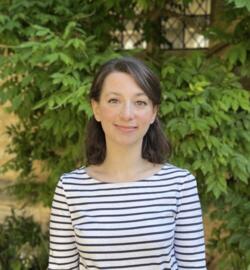 As an interdisciplinary thesis, it investigates different material aspects of text-production and transmission as part of its wider exploration of the interrelationship between writing, materiality, and orality in a comparative range of Northwest Semitic texts. The project encompasses a range of texts from the Hebrew Bible and wider Northwest Semitic world, including the Deir ˁAlla Plaster Inscriptions, the Ugaritic funerary ritual KTU 1.161, the Priestly Blessing found in Numbers 6 and the Ketef Hinnom amulets, and Psalm 91.Hannah’s research draws on methods from oral theory and material culture studies, and her research interests include the study of poetics, performance, memory, literary traditions, writing practice, and composition history. She seeks to re-examine Northwest Semitic textual strategies with reference to the boundaries between text production and transmission.
As an interdisciplinary thesis, it investigates different material aspects of text-production and transmission as part of its wider exploration of the interrelationship between writing, materiality, and orality in a comparative range of Northwest Semitic texts. The project encompasses a range of texts from the Hebrew Bible and wider Northwest Semitic world, including the Deir ˁAlla Plaster Inscriptions, the Ugaritic funerary ritual KTU 1.161, the Priestly Blessing found in Numbers 6 and the Ketef Hinnom amulets, and Psalm 91.Hannah’s research draws on methods from oral theory and material culture studies, and her research interests include the study of poetics, performance, memory, literary traditions, writing practice, and composition history. She seeks to re-examine Northwest Semitic textual strategies with reference to the boundaries between text production and transmission.
Hannah has presented on aspects of her research at the Old Testament Society at the University of Göttingen, the VIEWS Project at the University of Cambridge, and the University of Oxford.
Emily Branton, affiliated researcher
Emily Branton is a PhD candidate in Hebrew Bible at the University of North Carolina - Chapel Hill, and a Visiting Instructor in Jewish Studies at Mount Holyoke College. Her research explores ancient Near Eastern theories of speech and cognition. Her dissertation, “Words that Stand: Efficacious Speech in Ancient Israel,” analyzes the conceptual metaphors used to represent speech acts in Biblical Hebrew, and in doing so also argues for the utility of conceptual metaphor theory as a critical philological tool. A case study from this dissertation was recently published in Vetus Testamentum as an article titled “What’s In A Name: The Fulfillment Metaphor in Biblical Hebrew.” She held an Educational and Cultural Affairs Junior Research Fellowship at the Albright Institute for Archaeological Research in Jerusalem (2023-2024), and was the 2022-2023 Dissertation Fellow at the Carolina Center for Jewish Studies.
Ellen De Doncker, affiliated researcher
 Ellen De Doncker is a Doctor in Theology (Biblical Studies). She obtained her PhD under the direction of Prof. Hans Ausloos from the Université Catholique de Louvain (UCLouvain, Belgium) in April 2025. Her dissertation, “A Human God? A Comparative Analysis of Anthropomorphisms in the Hebrew and Greek Pentateuch,” offers a study of the transformation of anthropomorphic language across the Hebrew and Greek textual traditions of the Pentateuch. Her research interests include Old Testament anthropology, metaphor theory, sensory perception in ancient texts, and Septuagint studies. She has furthermore contributed to several interdisciplinary research projects, including “Une deuxième peau à vif: vêtement, genre et violence dans la Bible hébraïque” (Université de Montréal), which explored gendered violence through textiles in the Hebrew Bible; and “Modernity and Holocaust in Lithuania: Philosophical Analysis of Moral Dilemmas” (University of Vilnius), focusing on ethical reflection and post-Holocaust theology. She was a visiting researcher at UCLA’s NELC department in the winter of 2024, where she studied with Prof. William Schniedewind. Her own PhD research, “A Human God?” was fully funded by the Belgian F.R.S.–FNRS and was embedded in the research group “Septante et critique textuelle” at UCLouvain. She currently plans a postdoctoral project investigating the theological, cultural, and linguistic dimensions of touch in the Hebrew Bible and its reception in the Septuagint.
Ellen De Doncker is a Doctor in Theology (Biblical Studies). She obtained her PhD under the direction of Prof. Hans Ausloos from the Université Catholique de Louvain (UCLouvain, Belgium) in April 2025. Her dissertation, “A Human God? A Comparative Analysis of Anthropomorphisms in the Hebrew and Greek Pentateuch,” offers a study of the transformation of anthropomorphic language across the Hebrew and Greek textual traditions of the Pentateuch. Her research interests include Old Testament anthropology, metaphor theory, sensory perception in ancient texts, and Septuagint studies. She has furthermore contributed to several interdisciplinary research projects, including “Une deuxième peau à vif: vêtement, genre et violence dans la Bible hébraïque” (Université de Montréal), which explored gendered violence through textiles in the Hebrew Bible; and “Modernity and Holocaust in Lithuania: Philosophical Analysis of Moral Dilemmas” (University of Vilnius), focusing on ethical reflection and post-Holocaust theology. She was a visiting researcher at UCLA’s NELC department in the winter of 2024, where she studied with Prof. William Schniedewind. Her own PhD research, “A Human God?” was fully funded by the Belgian F.R.S.–FNRS and was embedded in the research group “Septante et critique textuelle” at UCLouvain. She currently plans a postdoctoral project investigating the theological, cultural, and linguistic dimensions of touch in the Hebrew Bible and its reception in the Septuagint.
Molly Drake, affiliated researcher

Yannik Ehmer, visiting doctoral researcher (2023-2024)
Yannik Ehmer is a doctoral candidate in Hebrew Bible in the Faculty of Theology at the Humboldt University of Berlin. A Doctoral fellow of the German Academic Scholarship Foundation (Studienstiftung des deutschen Volkes), their dissertation is entitled “Knotted Knowledge - New Perspectives on the Poetics and Composition of Prov 10:1-22:16.”
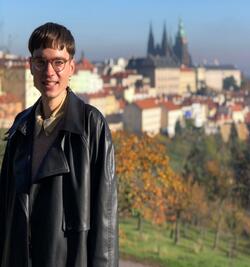
They have studied philosophy, mathematics and Protestant theology in Berlin, Edinburgh and Seoul, and most recently held appointments as visiting doctoral researcher at Yale Divinity School and the Pontificia Universidad Católica de Chile. Their teaching includes experience as assistant to the Chair of Religious, Literary and Contemporary History of Early Christianity (Prof. Dr. C. Gerber) at the Humboldt University of Berlin.
Their main research interests include biblical theology and philosophy with a focus on wisdom literature, phenomenology, postmodern hermeneutics(s) and epistemologies, the intersections between aesthetics and ethics, and queer studies and gender studies and their relationship to theology and philosophy.
Rachel Frish, postdoctoral fellow (2022-2023)
Dr. Frish is a former postdoctoral fellow at Yale Divinity School under the supervision of Jacqueline Vayntrub. Her main research interests include prophetic literature and biblical and post-biblical wisdom literature. Frish explores the development of traditions and worldviews from the Bible through Tannaitic literature and early Christianity. 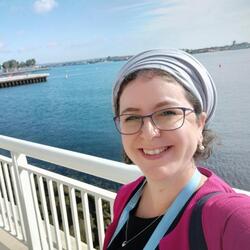 She seeks to define the core ideas that characterize the biblical traditions as well as their unique developments in the various literary works, tracing their theological range and later developments. Frish’s research combines a range of methodological approaches, including philological-historical, literary, biblical semantics and comparative analysis to Ancient Near Eastern cultures.
She seeks to define the core ideas that characterize the biblical traditions as well as their unique developments in the various literary works, tracing their theological range and later developments. Frish’s research combines a range of methodological approaches, including philological-historical, literary, biblical semantics and comparative analysis to Ancient Near Eastern cultures.
Frish’s dissertation, completed in 2021 at Bar Ilan University and titled Wisdom Sayings in the Book of Jeremiah, discusses the nexus of wisdom and prophetic traditions in the book of Jeremiah, examined how these traditions influenced each other and pointed out the implications on the development of wisdom tradition and texts. Her current research focuses on the source of wisdom in biblical and post-biblical works. Access her publications here.
David A. Hannan, affiliated researcher
David A. Hannan is a Ph.D. Student in Hebrew Bible at Harvard University where he also serves as the graduate coordinator for Harvard’s Hebrew Bible Workshop. He has recently published a note in Nouvelles Assyriologiques Brèves et Utilitaires (N.A.B.U.) and an article in Vetus Testamentum entitled “Seen from Afar: Genesis 22:4 in Comparative Perspective.” His research interests include warfare rituals such as plunder, the literary representation of violence, the Deuteronomistic History and its formation, the history of Israelite religion, royal ideology, historiography, (meta)textuality, horror theory, and the comparative method. His dissertation will likely examine the redactional development of plunder texts and the shifting discourses around plunder across various corpora that comprise the Hebrew Bible. You can access his publications here.
Jenna Kemp, affiliated researcher
Dr. Kemp is a lecturer at UC Berkeley in Hebrew Bible, and formerly a postdoctoral fellow at Universität Basel. Her research interests focus on socio-literary approaches to the formation of the Hebrew Bible as she examines the entanglement of textual production and interpretation. Kemp received her Ph.D. from UC Berkeley in 2021 and is preparing her dissertation — “Forgetting to Remember: Theorizing the Role of the Forgotten in the Production of the Hebrew Bible” — for publication. 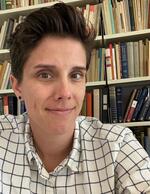 In this project, she examines the Bible as a cultural object and analyzes the detectable text formation practices therein (e.g. redaction, additions, etc.) as acts of cultural memory. Her main interest in doing so is to situate cultural memory as a process that can account for the transmission of cultural objects over time. Forgetting, she argues, functions as a key element in this process and in the formation of cultural symbols as sites of memory. In her work broadly, she blends philological approaches to the Bible with theoretical approaches to historiography, cultural memory, and literary culture. At Universität Basel, Kemp is beginning her next project, which flows conceptually from her dissertation and approaches the theme of mass annihilation in the book of Joshua. She seeks to understand how the memory of these fictive events are transformed not only in the composition of Joshua itself, but also in early interpretive communities.
In this project, she examines the Bible as a cultural object and analyzes the detectable text formation practices therein (e.g. redaction, additions, etc.) as acts of cultural memory. Her main interest in doing so is to situate cultural memory as a process that can account for the transmission of cultural objects over time. Forgetting, she argues, functions as a key element in this process and in the formation of cultural symbols as sites of memory. In her work broadly, she blends philological approaches to the Bible with theoretical approaches to historiography, cultural memory, and literary culture. At Universität Basel, Kemp is beginning her next project, which flows conceptually from her dissertation and approaches the theme of mass annihilation in the book of Joshua. She seeks to understand how the memory of these fictive events are transformed not only in the composition of Joshua itself, but also in early interpretive communities.
Victor Knight, affiliated researcher
Victor Knight is a PhD candidate in Hebrew Bible and Teaching Fellow at the University of North Carolina, Chapel Hill. His work focuses on conceptions of deity and divine embodiment in the Hebrew Bible and Ancient Near East, Ancient Near Eastern iconography, and NW Semitic literature and religion. His dissertation project, “Beyond Typology: Divine Identity and Materiality in the Hebrew Bible and Ancient Near East,” argues for an inherent, decentralized breadth of persona and body for deities in the Ancient Near East. In conversation with Deleuzian assemblage theory and theories of embodiment, his project also constitutes a meta-critical reexamination of the influences on and dominant paradigms behind contemporary descriptive schemata for ancient near eastern gods and goddesses.
Theodore Motzkin, affiliated researcher
Theodore Motzkin is a PhD student in Hebrew Bible at Harvard University, through the Committee on the Study of Religion. His research interests include the Hebrew Bible in both its ancient Near Eastern context and its communities of redaction and reception in the Second Temple period; Assyriology; Rabbinics; and ancient Greek religion and literature.
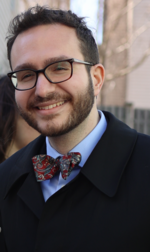
His dissertation project will likely focus on Temple theology, cult, and embodied senses in Persian Yehud and the Second Temple, as well as parallel (and not so parallel) phenomena in Mesopotamia and the Greek world. In addition, Theo is co-chair of Harvard’s Jewish Studies Workshop.